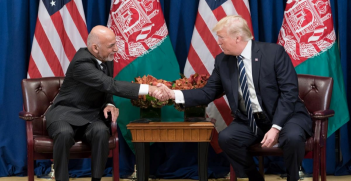Trump Haunts China's Dreams

China’s fortunes may or may not be blessed by Donald Trump’s victory in the US election earlier this month. Just as there are three potentially negative outcomes, there are also three future Asia-Pacific scenarios that would see China’s political influence and economic prospects increase. Whichever occurs, the world will be watching.
Three nightmares
There are three reasons why Trump’s electoral victory might not be good for China’s foreign policy. First, Trump advocated an offshore balancing strategy to retreat from the Asia-Pacific. It may sound nice for China because it can fill the ‘strategic vacuum’ left by the US. However, the reality is there is no guarantee of such a vacuum if the US withdraws from the Pacific. Other regional powers such as Japan, South Korea, India and Australia, will look for closer security ties, even forming new alliances, to deal with China.
The existing US-led ‘hub-and-spokes’ system is by no means good for China. However, the strategic uncertainties as a result of a US retreat will be even worse for China’s strategic environment. Japan and South Korea, even Australia, might choose to develop nuclear weapons for a power equilibrium with a rising China and an ever more dangerous North Korea. The territorial disputes in the East China Sea and the South China Sea may easily trigger military conflicts among nations, and arms races seem inevitable.
Moreover, if Trump reconciles US relations with Russia, China might be singled out as the primary target or threat of the US. Then the US might not retreat from the Pacific. Instead, the US will be able to assemble more resources and energy to squeeze China’s strategic space in the region. For example, the US might buttress its military presence and increase the Freedom of Navigation operations in the disputed South China Sea with cooperation from other states in the region.
If Russia starts to reset relations with the US, it might limit its military cooperation and technology transfers to China. Consequently, China will need a much longer time to catch up with the US militarily. For China, Russia as a US enemy will be China’s friend, but Russia as a US friend might not be good for China.
Even if Trump does not militarily retreat from the Pacific, he may wage trade and currency wars with China as promised during his election campaign. Trump believes that China manipulates its currency, and so-called “free trade” is not fair for the American people. If the country turns to protectionism, China’s economy will feel the pain—especially in the exporting sectors. A decline in trade and investment with the United States will hurt China’s economic growth, and in turn, it will weaken the political legitimacy of the Chinese Communist Party.
Three good dreams
None of these worst-case scenarios might come true. Three good things might happen to China along with Trump’s victory. First, Trump is facing a divided nation. Domestic challenges, such as economic growth, employment opportunity and health care reform, will be Trump’s first priority once assuming office. These domestic policy priorities will leave Trump with limited energy for foreign policy. Therefore, China might not be on Trump’s to-do list for some time.
Moreover, no businessman can ignore the largest consumer market in the world. Nor will Trump. As a CEO, Trump used to work with Chinese companies to build Trump towers and hotels around the world. It is reasonable to believe that President Trump will find more business and investment opportunities with China. China’s infrastructure-based “one belt and one road” initiative will be a good business proposal, which can bring the US and China together on the same page.
Second, Trump’s foreign policy might stay away from traditional liberal ideas and focus on economic interests. Human rights and democracy will remain in the official narrative and rhetoric, but they will not be a Trump priority when he talks to Chinese leaders.
Since Trump publicly criticised the US electoral system and claimed that it was “rigged”, it seems difficult for him to lecture Chinese leaders on democracy. For Chinese leaders, it will also be easier to find common economic interests with Trump than to seek common understanding on democracy with Hillary Clinton.
One thing the Chinese leaders still remember is that it was Nixon—a famous anti-communist Republican—who opened the diplomatic door to China in the 1970s. Therefore, it is an open yet ironic secret that Communist China is more likely to do business with the right-wing Republicans than to deal with the “hypocritical” left-wing Democrats.
Lastly, Trump’s administration might not withdraw from Asia immediately, but it will reduce or limit its involvement in the region. One foreign policy-related question that Trump posed during his campaign was why should the US protect Japan or other allies in the Asia-Pacific? Trump’s answer was easy: “I will make them pay for alliances.”
Japan and other states might indeed pay or share more financial responsibilities for maintaining their alliances with the US. However, this business-transaction-based alliance might or might not work during military crises or conflicts because it is difficult to calculate dollar values of the Senkaku/ Diaoyu islands and Taiwan for the US. It might be even more difficult to attract US attention to the South China Sea, simply because the Southeast Asian countries might not be able to pay for US involvement.
For China, therefore, the US election results might be good news. If China can seize the opportunity to resolve its territorial disputes without US involvement, it can convince the world that it is really a responsible stakeholder or even a new type of hegemon for the region. However, solving territorial disputes is never an easy business, no matter with or without US involvement. The best China can hope is to keep the status quo. At least, without US involvement China will have more room to manoeuvre.
For Chinese leaders, it is still difficult to see which ones will come true after Trump enters the White House—the three nightmares or the three good dreams. The best Chinese leaders can do now is to be prepared for a ‘good bargain’ with Trump. As Obama said during the election night, “no matter what happens, the sun will rise in the morning”.
Kai He is an associate professor of international relations at Griffith Asia Institute and Centre for Governance and Public Policy, Griffith University.
Dr Huiyun Feng is a senior lecturer in the School of Government and International Relations at Griffith University.
This article is published under a Creative Commons Licence and may be republished with attribution.





